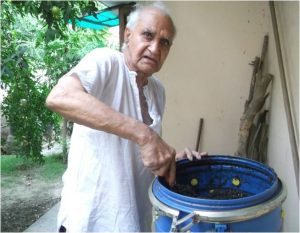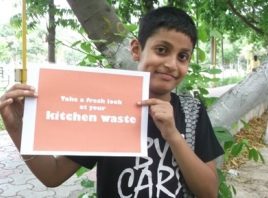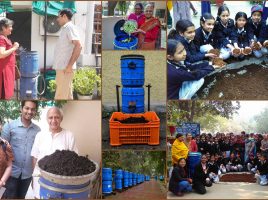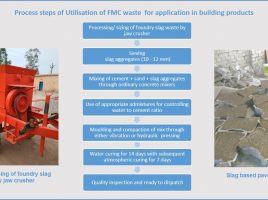HOME COMPOSTER: A WAY FOR A CLEANER AND GREENER FUTURE
Development Alternatives (DA) in collaboration with the Delhi Government has piloted the initiative of ‘Decentralised Waste Management’ in E-block of Saraswati Vihar, Pitampura. The project is being supported by the Department of Environment, Government of National Capital Territory. Development Alternatives has built capacities of residents, implemented decentralised waste management practise and built public perspectives for advocating ‘Zero Waste’ concept through home composting.
Residents’ capacities have been built to manage bio-degradable waste (mainly kitchen waste) in a decentralised manner, by the CLEAN-India team of Development Alternatives, along with the support of Resident Welfare Associations (RWA). As part of this project, household waste care composters have been installed at 40 households to convert the kitchen waste into organic manure.
Mrs. Rekha Wadhva, a resident of E- block Saraswati Vihar, Pitampura is a passionate home maker and has a beautiful terrace garden that speaks of her interest in gardening. “We planned a terrace garden when we were building our house. And today, we are growing fruits and vegetables for our family. It all started with my love for palak pakoda (fried snack), palak (spinach) seed germination started my plantation drive, which then got extended to rubber, rose, mousmi (sweet lemon), lemon, tulsi (holy basil), ajwain (bishop’s weed) and various other varieties of plants in the following years” says Mrs. Wadhwa. It’s been two years that she is grafting in her own house and experimenting to create new varieties of flowers and plants. Brinjal and tomato grafting are her first grafted varieties. People are usually amused and keen on walking through her kitchen garden. When the CLEAN-India team shared the concept of kitchen waste recycling with the various households in Saraswati Vihar, she was first amongst the 40 households to grab the opportunity to get trained to convert their kitchen waste into manure through waste care composters and installed the composter at her home. “I have always loved greenery and a large part of my time goes into gardening. The cost of manure that I buy from the market is quite high and moreover it has fertilisers in it. But after getting the composter installed at home, it serves multiple purposes. The waste produced at our home is converted into compost and also reduces the waste management problem faced by various households. All the cooked and uncooked food waste including dairy products, vegetables and fruit peels, leftover food and garden trimmings get converted into nutritious manure. I collect wet waste everyday; dump it in waste care composter and put a little soil, saw dust and dry leaves on it. The process is repeated every day. Now only non recyclable material goes to our local waste collector as recyclable material is stored in the bin. What makes this a smooth process is that it’s absolutely easy to maintain the composter, as they are light, pest-free, noiseless, and rat proof. The manure from wet waste will be ready within two months at an initial phase, and will be used for gardening. Homemade compost is ideal and can be suitable for any type of plant to grow. Compost is the best of everything that plants need: mulch, plant food, fungicide and disease deterrent.”
maker and has a beautiful terrace garden that speaks of her interest in gardening. “We planned a terrace garden when we were building our house. And today, we are growing fruits and vegetables for our family. It all started with my love for palak pakoda (fried snack), palak (spinach) seed germination started my plantation drive, which then got extended to rubber, rose, mousmi (sweet lemon), lemon, tulsi (holy basil), ajwain (bishop’s weed) and various other varieties of plants in the following years” says Mrs. Wadhwa. It’s been two years that she is grafting in her own house and experimenting to create new varieties of flowers and plants. Brinjal and tomato grafting are her first grafted varieties. People are usually amused and keen on walking through her kitchen garden. When the CLEAN-India team shared the concept of kitchen waste recycling with the various households in Saraswati Vihar, she was first amongst the 40 households to grab the opportunity to get trained to convert their kitchen waste into manure through waste care composters and installed the composter at her home. “I have always loved greenery and a large part of my time goes into gardening. The cost of manure that I buy from the market is quite high and moreover it has fertilisers in it. But after getting the composter installed at home, it serves multiple purposes. The waste produced at our home is converted into compost and also reduces the waste management problem faced by various households. All the cooked and uncooked food waste including dairy products, vegetables and fruit peels, leftover food and garden trimmings get converted into nutritious manure. I collect wet waste everyday; dump it in waste care composter and put a little soil, saw dust and dry leaves on it. The process is repeated every day. Now only non recyclable material goes to our local waste collector as recyclable material is stored in the bin. What makes this a smooth process is that it’s absolutely easy to maintain the composter, as they are light, pest-free, noiseless, and rat proof. The manure from wet waste will be ready within two months at an initial phase, and will be used for gardening. Homemade compost is ideal and can be suitable for any type of plant to grow. Compost is the best of everything that plants need: mulch, plant food, fungicide and disease deterrent.”
Mrs. Wadhwa further adds, “I would like to express my gratitude to Development Alternatives for initiating this pilot with our RWA and for promoting green practises by kitchen waste recycling. Delhi faces a grave challenge of waste management. Managing solid waste at household level is a necessary step to make people aware about their roles and responsibilities. Kitchen waste recycling will sensitise people, evoke their thoughts, perspectives, bring them together and engage in a common process to work for environment. I will also motivate more residents of our society to start gardening and reuse waste as productive resource.”
Another resident from Saraswati Vihar, is an 85 years old retired government official, Mr. V. Kapuria. It is a delight to watch his zest and eagerness as he parades his garden adorned with grape creepers and fresh fruits of pomegranate. When CLEAN-India met him he shared his experience of using and managing the home made waste care composter since last four years. He explains, “The size and capacity of the composter provided by the team of Development Alternatives group is apt for the amount of waste generated from my garden. This blue equipment helps to make compost for my plants. Composting mimics and intensifies nature’s recycling process and is easier than what people usually presume. By embarking on the waste free lifestyle, my life has changed for the better. I feel happier to lead a more meaningful life.” To strengthen the initiative beyond the society, waste recycling sessions will be conducted across the schools of Pitampura to engage young minds in waste segregation and recycling. These sessions will aim to a) create awareness in schools, b) scale the initiatives of decentralised waste management in Delhi, c) reduce the organic waste dumped in the landfills and, d) promote civic action for sustainability. The project will conclude with selected families sharing their experiences of composting with their peers, and neighbourhood. In the next phase, zonal level composting will be conducted with at least ten societies who will later be trained on home composting.
Kapuria. It is a delight to watch his zest and eagerness as he parades his garden adorned with grape creepers and fresh fruits of pomegranate. When CLEAN-India met him he shared his experience of using and managing the home made waste care composter since last four years. He explains, “The size and capacity of the composter provided by the team of Development Alternatives group is apt for the amount of waste generated from my garden. This blue equipment helps to make compost for my plants. Composting mimics and intensifies nature’s recycling process and is easier than what people usually presume. By embarking on the waste free lifestyle, my life has changed for the better. I feel happier to lead a more meaningful life.” To strengthen the initiative beyond the society, waste recycling sessions will be conducted across the schools of Pitampura to engage young minds in waste segregation and recycling. These sessions will aim to a) create awareness in schools, b) scale the initiatives of decentralised waste management in Delhi, c) reduce the organic waste dumped in the landfills and, d) promote civic action for sustainability. The project will conclude with selected families sharing their experiences of composting with their peers, and neighbourhood. In the next phase, zonal level composting will be conducted with at least ten societies who will later be trained on home composting.
The kitchen waste recycling is one of the key solutions to the emerging need of decentralised waste management. Generating resources out of biodegradable wastes in our house is an opportunity for every citizen to influence a system of recyclable waste and retain the ecological cycle.
Vandana Saini
vsaini@devalt.org
Read More
Home Composting: Reduce, Reuse and Recycle!
The views expressed in the article are those of the author’s and not necessarily those of Development Alternatives.






Leave a Reply